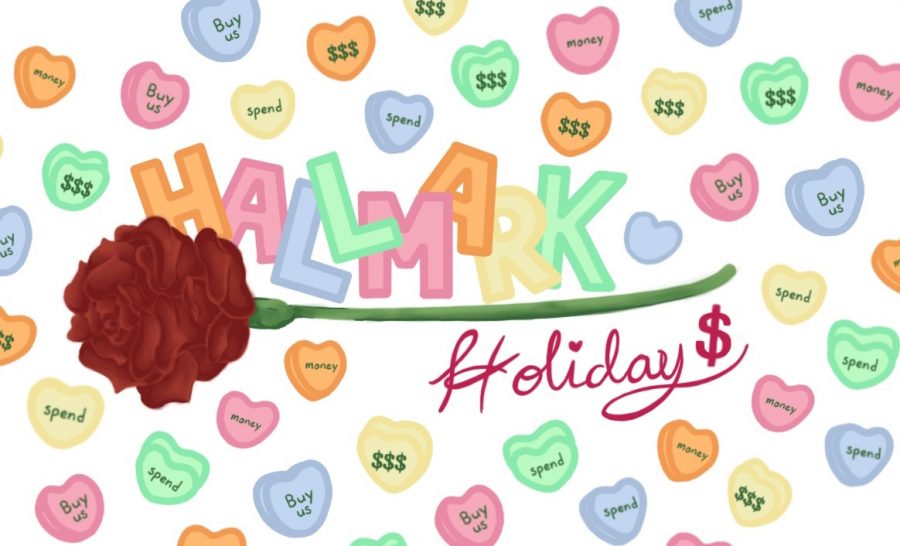Hallmark holidays
As the years have gone by, many holidays have seen their true meaning disappear as they turn into money-making mechanisms for large companies.
Over time, many holidays have become “Hallmark Holidays,” existing primarily for commercial purposes.
If you’ve ever gone shopping during the holidays, it’s hard to miss the massive displays filled top to bottom with holiday decorations, themed food items and gift ideas. The holiday season increasingly feels like a several week-long wild goose chase for the nonexistent “perfect gift.” The hunt starts to pick away at the original meaning of the holiday and urges the question: are holidays becoming too commercialized?
The commercialization of holidays dilutes the original intention of the special day, which can easily be seen with Valentine’s Day. Named after Saint Valentine, who was said to have secretly married people in Rome against the emperor’s orders, the holiday soon became an opportunity for people to express love to others. Advertising and developments of printing in mass production helped Valentine’s Day take commercial roots. In the 1840s, an American newspaper called “The Public Ledger” endorsed the holiday, saying people needed “more soul-play and less head-work.” This transformed the word “valentine” from signifying a person to an exchange of objects. From there, marketing companies began luring people into celebrating in the form of gifts and strategizing ways to turn consumerism into affection.
The ever-increasing pressure to go above and beyond while buying things for others has created a holiday based on monetized love. According to the National Retail Association, the average amount spent on gifts for Valentine’s Day has increased by $60 over the past decade due to couples being lured into buying flowers, chocolates and elaborate gifts to go along with fancy dates. The rise of anti-Valentine’s Day merchandise has attracted singles to buy products expressing their distaste and adds to the idea that buying gifts, whether it’s for yourself or someone you care about, is the only way to express love.
Excessive alcohol consumption has become a major part of holidays like St. Patrick’s Day when people “celebrate” over drinks without knowing the holiday’s history. St. Patrick’s Day changed from a religious celebration in the 17th century honoring the life of Saint Patrick and the arrival of Christianity in Ireland, to a day of mass intoxication and wearing shirts that say, “Kiss me, I’m Irish.” Originally a feast day, the tradition was then brought by Irish immigrants to America, where it grew. The excessive alcohol consumption comes from the holiday allowing Christians to have a break from Lent, when in reality, drinking only became part of the celebration after a marketing push from beer companies in the 1980s.
However, it’s not just alcohol companies that profit from the commercialization of holidays; other major corporations such as Hallmark do, too. According to Hallmark, on Valentine’s Day alone, about 145 million cards are exchanged, and the average person celebrating the holiday spent $143 in total in 2018. Along with their card sales, during the Christmas season, it’s estimated that in 2017, Hallmark made $390 million from their festive movies.
It may seem shocking, but should any of this really be a huge surprise? We live in a commercial society based on advertisements and shiny logos that convince us these products are essential to celebrate the holidays. Pumpkin spice lattes in the fall, plastering Santa on just about every product during the Christmas season, and repackaging every candy in red and pink hearts in February have become some of the biggest parts of the holiday season.
The extravagant displays and expectations for gifts have made birthdays, anniversaries and holidays feel like the only days we can express our gratitude for one another. Because we go so over the top on these certain days, it takes away the need to express gratitude in our everyday lives. As we get lost in our day-to-day chaos, we forget to remind other people what they mean to us, so we overcompensate on a select few days of the year.
The next time you are frantically searching for a gift the night before a holiday, consider ways you can show your love for others all year round instead of just going all-out on certain days of the year. Think of less commercialized ways you can celebrate holidays and express your love for others. Try writing them a note or even just texting them, because love shouldn’t be based on material possessions or the monetary value of a gift.
Your donation will support the student journalists of West High School. Your contribution will allow us to purchase Scholarship Yearbooks, newsroom equipment and cover our annual website hosting costs.

(they/them) Katherine Shoppa is a senior in high school and this is their third year on staff. They are the Co-Editor-in-Chief of the...

(she/her) Sila Duran is a senior at West and it's her third year on staff. Sila is the Print Assistant Design Editor. You can typically find Sila at art...



